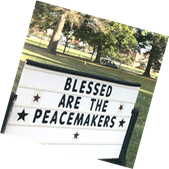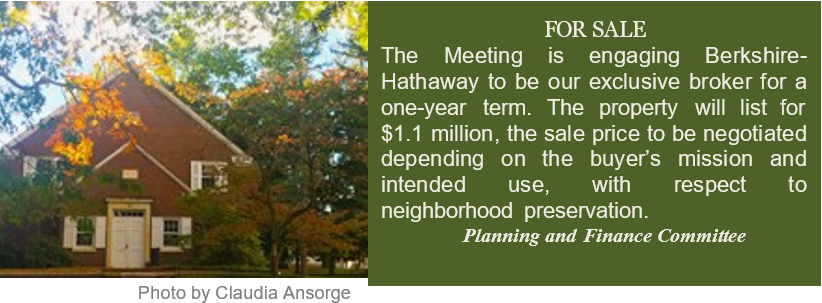FALL 2020
POUGHKEEPSIE FRIENDS MEETING
Poughkeepsiequakers.wordpress.com
Advice 1: From the beginnings of our Society, we have considered it necessary to assemble frequently for the purpose of public worship held in expectant waiting for divine guidance, thereby manifesting our belief in and dependence upon our creator. Meeting for worship is fundamental for us, and we should be diligent and punctual in our attendance. We seek, through communion with God, the strengthening influence of the Holy Spirit to enable us to discharge with fidelity the services we owe to God, to each other, and to all people.
Query 9: Do we participate actively and intelligently in the political life of our country? Are we conscientious in fulfilling all obligations of state and society that are not contrary to the leading of God? Do we do all in our power to secure civil rights for all? Do we emphasize the single standard of truth, and are we free from the use of oaths?

WITNESS LOVE Gabriel‘s House, the Unitarian Fellowship and others from the community joined together with Poughkeepsie Friends to hold a vigil in July 17 at the Friends Meeting House. The vigil showed support for a better world, where we learn to live together in peace and love. We witnessed to the fact that we are all brothers and sisters and we need to respect and love each other.

Photos l.to r.) Lynne James and Pat Lamara (from UU); Don Badgley and Fred Doneit; Maureen Derasmo and Peg Keiser.
EQUALITY
Recognizing the dignity of every person…Treating each person with respect…Rejecting all forms of discrimination…Looking for “that of God” in everyone — For centuries Quakers have strived to achieve greater equality in themselves, in their communities, and in their society. The testimony of Equality has made great change possible. It is the theme of this Fall issue of our newsletter.
—Friendly News Committee

Lynne James: Equality & Earth Care
For me, our Quaker testimonies all work together to shape my spiritual beliefs. In particular, the 2 testimonies of Equality and Earthcare are married together in my mind. They blend together a strong sense of connection and equality not just with other human beings, but also with nonhuman animals, trees, plants, birds, the fish in the sea and the earth we inhabit and walk upon.
From NYYM Faith and Practice “The earth is the Lord’s and the fullness thereof.” All things are parts of God’s creation: the air and sky, rocks and minerals, animals and plants, the human race, the order of the universe. All natural resources are God’s gifts”.
If the entire world is, as I believe, interconnected, does not the gift of spirit then make us all equal in the eyes of Spirit or the Creator? The following quote is from the Vision and Witness statements of Quaker Earthcare Witness.

“ We are called to live in right relationship with all Creation, recognizing that the entire world is interconnected and is a manifestation of God. “It follows for me, then, that I am not “more than” this beautiful butterfly resting in my back yard before her long journey south. We are equal and one in the eyes of Spirit.
Lynne
Equality has many layers of meaning and many dimensions. For Friends it begins with the understanding that we are each of us, both a physical being and a Spirit being. The Spirit is infinite and eternal and its presence within each of us unites us as a single family. When we Experience that oneness with the Eternal unchangeable moment we also experience it as elemental to all of life. When we allow that Experience to order our lives, then even religion recedes and only the Experience remains. Thus, we seek it both as community and as individuals. The following poem rose up in one of those Experiences while I was in Iceland last year.
Don Badgley: The Experience of Oneness
Becoming
At the base of that waterfall in a faraway land,
enveloped in its roar and mists I came to know that
there are no faraway lands, I was the faraway,
the lost and distant,
as I slow became united
with the Source and immanent eternity that flowed beside, over, beneath
and within me
and there I awakened, becoming the river becoming.
Rosario DiSalvo:
A Level Playing Field

I thought that equality and fairness meant the same thing until I Googled Equality vs Justice and it read: “Justice is the quality of being fair, while equality is the
state of being equal.” Then I watched a YouTube video on Equity where I saw: Equity is treating different people differently. That was new for me.
YouTube video on Equity where I saw: Equity is treating different people differently. That was new for me.
We have achieved Equality under the law, in theory, but we have more to do to create a “level playing field to achieve Equity.”
In the cartoon the boxes had to be rearranged so that the three characters can enjoy the game. That implies rearrangement and the need for more resources. Not an easy task, but inequalities can no longer be ignored.

Cynthia Fisher: Standing Up for Truth By Claudia Ansorge
When Vassar College denied Cynthia Fisher tenure in 1985, the decision led to a battle that would be fought in the courts for more than a decade. The inequality at issue was marital status discrimination. For Cynthia, it was a test of integrity as well. “It helped me very much to be a Quaker,” she said. “When you testify in court, you’re asked to swear an oath. You don’t swear an oath as a Quaker, not on a Bible. You stand up and say the truth as you know the truth.”
Cynthia had been hired by Vassar in 1977 as a faculty member in the biology department. By 1985, she was on the tenure track as an Assistant Professor. She was also a married woman on the faculty of an institution that had never tenured a married woman in the “hard sciences” of biology, chemistry, physics, mathematics and earth science. During the previous century, dozens of single women had been tenured at the college in these departments.
Teaching and scholarship records were the alleged reasons she was given for being denied, fired and given a year to find another job. In response, Cynthia sued Vassar College for marital discrimation under Title VII of the 1964 Civil Rights Act. Under Title VII, plaintiff must prove that any apparent discrimination was intentional, not merely inadvertent.
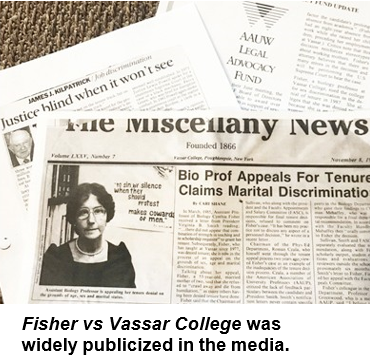
The plaintiff team in Fisher vs Vassar College consisted of Cynthia, her statistician husband Armen Fisher, and her solo practitioner lawyer Eleanore Jackson Piel. John Cannon, a senior labor partner at the New York City law firm of Sullivan and Cromwell, was the attorney for Vassar College. “We were standing up against legal obstacles, postponements and huge, deep pockets,”Cynthia explained. “It was a David and Goliath battle.”
Almost ten years later, in 1994, Judge Constance Baker Motley, in federal court in the southern district of New York, found that Vassar College had intentionally discriminated. In a 100-page opinion, the judge stated that, “In the hard sciences at Vassar, there was a belief that a married woman with children could not be a dedicated and productive scientist, and therefore
she was not one, despite substantial evidence to the contrary.” By court injunction, Cynthia was back at Vassar. The first court battle had been won, but the case would not be over for years.
The College did not challenge Cynthia’s record of teaching, scholarship and service which was supported at trial by three expert, outside witnesses. But the College appealed on its claim that plaintiff had not proved defendant’s intent to discriminate on the baasis of marital status.
In total, the case took 13 years, through various appeals and with Cynthia being fired and then re- instated three times by court order. The Legal Advocacy Board of the American Association of University Women voted to award her $10,000 to help defray costs associated with petitioning the U.S. Supreme Court that, finally, in 1998, refused to hear the case. Cynthia left Vassar but not without leaving reforms in her wake that included the tenure of several married women in the science departments.
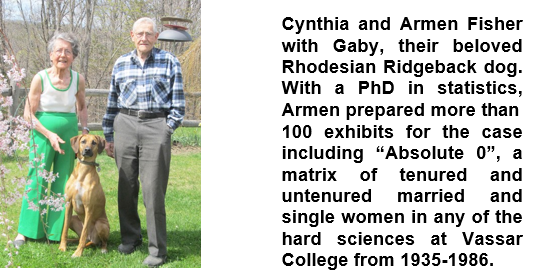 During those trying years, Cynthia posted a quote by Abraham Lincoln on the door of her office: “To sin by silence when they should protest makes cowards of men.” When asked recently about the case, she quoted another from U.S.Representative John Lewis: “I urge you to answer the highest calling of your heart and stand up for what you truly believe.”
During those trying years, Cynthia posted a quote by Abraham Lincoln on the door of her office: “To sin by silence when they should protest makes cowards of men.” When asked recently about the case, she quoted another from U.S.Representative John Lewis: “I urge you to answer the highest calling of your heart and stand up for what you truly believe.”
A New Book for Poughkeepsie Meeting Library:
CASTE: The Origins of Our Discontents by Isabel Wilkerson
“Caste: The Origins of Our Discontents” reaches the public in the midst of an intense debate over the history of racial oppression and the persistence of what is often called structural racial inequality.
Amid proposals to reform or abolish police departments and prisons, to explore reparations for slavery, to undo the racial foundations of capitalism, and to reconstruct many institutions of American life, Wilkerson reminds us that this is not the first time the United States, like other societies, has tried to come to grips with its foundational problem. Unless one reaches for those foundations and tears them out, she warns, caste is likely to remain with us long after our current moment of racial reckoning is done.” Isabel Wilkerson
2020 Acquisitions to the Poughkeepsie Friends Library include Caste by Isabel Wilkerson above as well as How to be an Antiracist by Ibram Kendi as well as White Fragility: Why It’s So Hard for White People to Talk About Racism. Friends Journal, August 2020, has made a partial list with excerpts from their reviews. The editors share these words of hope, “ All these books will help readers gain a fuller understanding of what life is truly like for non-White Americans today, and present ways to work toward a better, more just country for people of color.”
-Diane-Ellen and Sarah Faith
THREE WAYS TO TAKE-OUT BOOKS DURING COVID:
- Via the mobile unit…contact librarians Sarah Faith or Diane-Ellen. If you have a hard time getting out or cannot get out, we will sign the book of your choosing out for you and deliver it within the circumference of New Paltz, Hyde Park, Pleasant Valley, and (as boundaries).
2. Name a title and librarians will fetch the book from the Using COVID guidelines, when you contact us, we’ll arrange pick-up at one of our homes in the Poughkeepsie area.
3. If you want to visit the library for a longer browse, contact us and we will try to make this happen with social distance, masks, and unlocking the Meeting House
FRIENDS

Because Frank and Louise deLeeuw moved to Poughkeepsie when they were both retired, there is very little most of us know about their larger family and work lives. This article is a small attempt to address our ignorance at least about Frank.
Frank DeLeeuw
Interview by Dare Thompson
Frank celebrating his
90th birthday this year.
Frank’s father Henry was born and raised in Holland and had a career as a tobacco broker. His mother, Rachel Souhami, was born in Turkey but grew up in New York City and became a high school teacher. The two met on a transatlantic steamer when Henry was traveling on business and Rachel was returning to NY, and once they reached New York City they got married! They lived in Amsterdam where they had one son, Paul, in 1926 and then Frank in 1930. Both parents came from Jewish families but were not themselves practicing Jews. By 1935 Hitler was already occupying parts of Europe and between that danger and a job offer from CBS for Frank’s father, they moved to NYC, finally settling in Manhasset on Long Island. It was a fortunate move. Back in Holland Henry’s brother and an aunt and uncle died in the camps.
Frank’s parents wanted their boys to have a religious education, so they joined Manhasset Monthly Meeting where the boys attended First Day School. Frank remembers one of the teachers he had as a teenager there was outstanding. Frank and his brother were not particularly close both because of the four- year age gap and because his brother was autistic and almost totally involved in music, a passion which
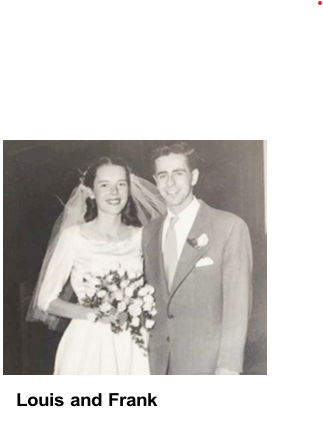
eventually became his profession. He especially enjoyed performing in and conducting operas, and he trained opera singers. While music doesn’t dominate Frank’s life, he too has always enjoyed it, and at Manhasset High School he played the flute in the school orchestra, an instrument that continues to bring him joy.
At age 16, Frank went off to Harvard where he majored in economics and became involved in Quaker activities. In the summer of his junior year he attended a Quaker work camp in Duluth, Minnesota where he met Louise Mason from California, a student at Stanford. They got to know each other even better when camp ended and they traveled to Chicago together on their return to their respective hometowns. Frank recalled thinking after only two weeks with her that “my life would be very happy if I were married to this woman.” He adds, “It took a little longer for
her.” They corresponded regularly after that and got married two years later, when they were both 21.
The couple lived in Boston until 1953 when Frank finished work on his master’s degree in public administration at Harvard. He then accepted a job as a senior statistical clerk at the San Francisco Federal Reserve Bank. He said it was a good job that gave him an opportunity to do many different things, and when he was still in his mid-twenties, he was offered a job at the Federal Reserve Board in Washington, DC where he and Louise ended up living for 45 years.
By the time of this move to D.C., their first two sons, David and Peter, had been born. Nick and Ben came along fairly soon after in Washington. Louise focused at first on the family and gradually, as time allowed, on her career as a psychotherapist. Meanwhile Frank continued to impress his fellow economists and researchers at the Federal Reserve Board where he was in the Business Conditions section and then headed a new division called Special Studies where he did mathematical modeling.

(above) Frank and Louise; (right) Frank with all his sons, 2018: (l. to r.) David, Peter, Ben and Nick.
After fourteen years at “the Fed,” and during the turmoil of the ‘60s, Frank spent a year of teaching at SUNY Buffalo. After that he spent six years at the Urban Institute, a think tank, and then went on to work
for the newly-created Congressional Budget Office. It was headed by its founding director, Alice Rivlin, an economist and expert on the U.
- federal budget and macroeconomic policy who served as Vice Chair of the Federal Reserve. Frank was one of only a few assistants and delighted in his work for the trailblazing economist writing
reports and testimony and doing other requirements of the office. But as “wonderful” as the job was in principle, Frank found the competitive, political atmosphere was giving him headaches and insomnia and he finally decided to leave. He ended up next at the Bureau of Economic Analysis in the Commerce Department where he eventually was awarded that
Department’s Gold Medal. Their website states that this medal is given to those individuals, groups, or organizations who have made “extraordinary achievements in support of the critical objectives of the Department of Commerce with a significant beneficial effect on the Nation or world.”
During those years Frank did a lot of tutoring – mostly with high schoolers and mostly in math. For two years Louise and he also worked together on an English language program she initiated for the Central American cleaning staff of the building they lived in. When they came to Poughkeepsie he was able to continue his commitment by working with Literacy Volunteers.
While in Washington, he continued to be a practicing Quaker but struggled to find a meeting for worship that met his needs. The messages at the District of Columbia monthly meeting were too political for him, but he eventually found a 9 AM splinter worship group that was more satisfying. In Poughkeepsie, he appreciates the emphasis on love and truth in our meeting for worship.
Frank retired from government work at age 60 but continued as a consultant for the next ten years. In 1990 when the Soviet Union was breaking up, he was brought in as an economics consultant to several of the newly-created countries and even got called to Indonesia and elsewhere in the Far East. By the turn of the century he had finally managed to scale down and truly retire. In 2003 he and Louise were able to move to Poughkeepsie to be closer to Nick and his family.
The Meeting has been blessed to have had both Louise and Frank in our Meeting since then, to witness their strong and loving marriage and devoted family, and to have them with us in worship and celebrations. As Louise’s memory failed and Frank’s eyesight and hearing faded, we witnessed how admirably they dealt with these difficulties.
When Louise died in August 2018, her loss was grieved by our Meeting and in worship. Frank lost not only his beloved partner but his “eyes,” as he had been so grateful that Louise could read both to and for him. Unable to drive, they had moved from their home on College Avenue to College View Tower near Vassar and the shops on Raymond Avenue, but navigation now became even more challenging for Frank.
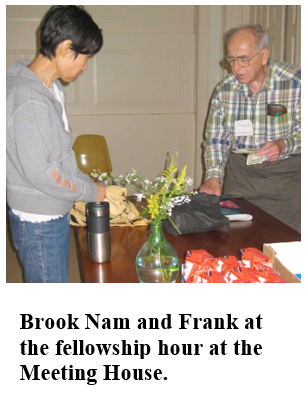
His hearing loss further isolated him.
Frank openly shared the struggles he was experiencing and recently the good news that some of the struggles are easing. He credits his cat for part of this change. Now that Cinnamon realizes that Louise is gone, he has turned his full attention to comforting Frank. A special friend from the Meeting is another reason. Brook Nam, a fellow volunteer at Green Haven, is listening to audio books with him once a week – currently Joseph Campbell’s Myths to Live By – and she has even influenced him to be more of a vegetarian. Brook feels grateful that she has gotten to know Frank better and admires his realistic and optimistic nature and his dry sense of humor. “He doesn’t dwell on regrets and physical challenges,” she says. Frank is close to and supported by his boys and their families,
Brook Nam and Frank at the fellowship hour at the Meeting House.
particularly Nick, Julie. Josh, Leslie and Lydia here in Poughkeepsie. Peter and his family were here recently from Chapel Hill for Frank’s 90th birthday, and when Louise died, all four families visited and worshipped with us when we gathered to remember Louise. They brought joyful remembrances to that sad time. “We really enjoyed our children,” he said with a smile.
A special treat at our Christmas celebrations has been to watch Frank play music with his grandchildren. The music of his own childhood continues to be a source of pleasure to him, although he is frustrated that the pandemic is keeping him from playing his flute with a local trio. When he listens to music, Bach is a favorite. When asked why, he said it’s the likeliest to put him in a zen state when he can accept the whole world just as it is.
In these challenging times, we can use a little more Bach in our lives. We can also be grateful to have Frank as a warm and wise F/friend and an inspiring example of a life that continues to be well-lived.

Alanna Badgley & Rudy Green

Alanna and Rudy met as colleague paramedics in Yonkers. Their relationship grew rapidly and both say that they “just knew”. We had about 3 weeks notice to make a “pandemic” wedding on June 13. It was challenging and in the end a beautiful event and day. We had 12 people present for the wedding on our front lawn, the bride and groom and 10 immediate family. There were also about 200 participating by Zoom. Many said “it was like we were there.” Rudy was born in Jamaica and is a wonderful addition to our family and a terrific guy. We admire him and love him very much. They live in Yonkers and with luck they may be able to move closer someday soon. Their love is a joy to behold.
—Don Badgley
